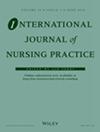Revitalizing Minds: Exploring the Transformative Power of Mindfulness-Based Nursing Interventions on Depression and Resilience in Oncology Patients—A Quasiexperimental Approach
Abstract
Aim
This study evaluated the impact of mindfulness-based nursing interventions (MBNIs) on reducing depression and enhancing resilience in oncology patients.
Background
Oncology patients face high levels of depression and weakened resilience, which significantly reduces their quality of life, affects their ability to adhere to treatment and worsens health outcomes. Additional stressors linked to the diagnosis, treatment side effects and future uncertainty may lead to emotional challenges. MBNIs offer an optimistic approach to these problems by inducing emotional regulation, depressive symptom reduction and the development of resilience through mindfulness practices. Although MBNIs have been increasingly recognized in mental health care, their effectiveness in oncology remains underinvestigated. Further research is needed concerning its potential benefits in fostering psychological well-being, improving patients' emotional coping with illness and enhancing the treatment experience.
Methods
This is a single-group quasiexperiment study adopting a pretest and posttest design, conducted at the Damietta Oncology Institute in Egypt between May and August 2023. This study recruited 88 patients who agreed to participate and were diagnosed with oncological diseases. The Patient Health Questionnaire-9 (PHQ-9) was used to measure depression, and the Connor–Davidson Resilience Scale (CD-RISC) was used to measure resilience. Data analysis was performed using paired t-tests and linear regressions. Pearson's correlation was also considered to establish the effects of the intervention and further provide correlations between depression and resilience.
Results
There was a significant improvement in depression and resilience following the MBNIs. The mean PHQ-9 score decreased significantly from 14.6 ± 3.2 to 9.7 ± 2.5, with p ≤ 0.001, indicating a significant reduction in depressive symptoms. Similarly, resilience scores increased from 56.4 ± 5.7 to 64.8 ± 6.3, with p ≤ 0.001 showing an improvement in resilience. The linear regression analysis showed that intervention accounted for 55% of changes in PHQ-9 scores and 41% in CD-RISC scores, thus suggesting that a significant portion of the observed changes in depressive symptomatology and resilience was due to the MBNIs. In addition, both levels of depressive symptomatology and resilience were highly inversely related at preintervention (r = 0.67 and p = 0.003) and postintervention (r = 0.58 and p = 0.012).
Conclusion
MBNIs significantly reduced symptoms of depression and enhanced resilience in oncology patients. The incorporation of MBNIs in cancer care may lead to an improvement in the emotional status and quality of life of patients. Future research should consider the long-term effects and applicability of these interventions in broader contexts within oncology treatment.

 求助内容:
求助内容: 应助结果提醒方式:
应助结果提醒方式:


